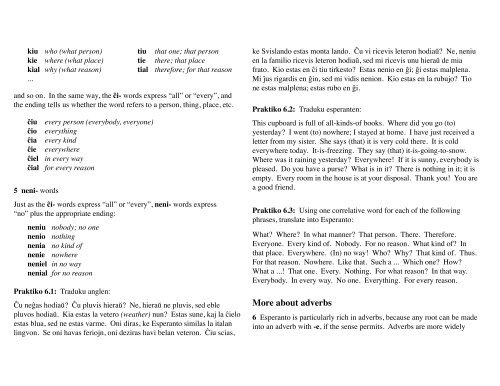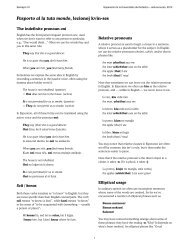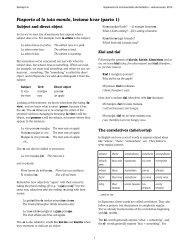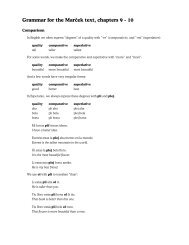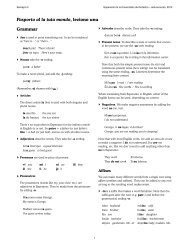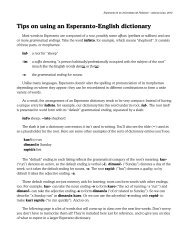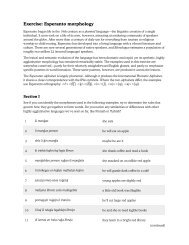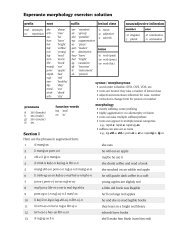The alphabet and pronunciation - Lodestone
The alphabet and pronunciation - Lodestone
The alphabet and pronunciation - Lodestone
- No tags were found...
Create successful ePaper yourself
Turn your PDF publications into a flip-book with our unique Google optimized e-Paper software.
! kiu! who (what person)! tiu! that one; that person! kie! where (what place)! tie! there; that place! kial! why (what reason)! tial! therefore; for that reason! ...<strong>and</strong> so on. In the same way, the "i- words express “all” or “every”, <strong>and</strong>the ending tells us whether the word refers to a person, thing, place, etc.! "iu! every person (everybody, everyone)! "io! everything! "ia! every kind! "ie! everywhere! "iel! in every way! "ial! for every reason5 neni- wordsJust as the "i- words express “all” or “every”, neni- words express“no” plus the appropriate ending:! neniu! nobody; no one! nenio! nothing! nenia! no kind of! nenie! nowhere! neniel! in no way! nenial! for no reasonPraktiko 6.1: Traduku anglen:"u ne#as hodia$? "u pluvis hiera$? Ne, hiera$ ne pluvis, sed eblepluvos hodia$. Kia estas la vetero (weather) nun? Estas sune, kaj la %ieloestas blua, sed ne estas varme. Oni diras, ke Esperanto similas la italanlingvon. Se oni havas feriojn, oni deziras havi belan veteron. "iu scias,ke Svisl<strong>and</strong>o estas monta l<strong>and</strong>o. "u vi ricevis leteron hodia$? Ne, neniuen la familio ricevis leteron hodia$, sed mi ricevis unu hiera$ de miafrato. Kio estas en %i tiu tirkesto? Estas nenio en #i; #i estas malplena.Mi &us rigardis en #in, sed mi vidis nenion. Kio estas en la rubujo? Tione estas malplena; estas rubo en #i.Praktiko 6.2: Traduku esperanten:This cupboard is full of all-kinds-of books. Where did you go (to)yesterday? I went (to) nowhere; I stayed at home. I have just received aletter from my sister. She says (that) it is very cold there. It is coldeverywhere today. It-is-freezing. <strong>The</strong>y say (that) it-is-going-to-snow.Where was it raining yesterday? Everywhere! If it is sunny, everybody ispleased. Do you have a purse? What is in it? <strong>The</strong>re is nothing in it; it isempty. Every room in the house is at your disposal. Thank you! You area good friend.Praktiko 6.3: Using one correlative word for each of the followingphrases, translate into Esperanto:What? Where? In what manner? That person. <strong>The</strong>re. <strong>The</strong>refore.Everyone. Every kind of. Nobody. For no reason. What kind of? Inthat place. Everywhere. (In) no way! Who? Why? That kind of. Thus.For that reason. Nowhere. Like that. Such a ... Which one? How?What a ...! That one. Every. Nothing. For what reason? In that way.Everybody. In every way. No one. Everything. For every reason.More about adverbs6 Esperanto is particularly rich in adverbs, because any root can be madeinto an adverb with -e, if the sense permits. Adverbs are more widely


